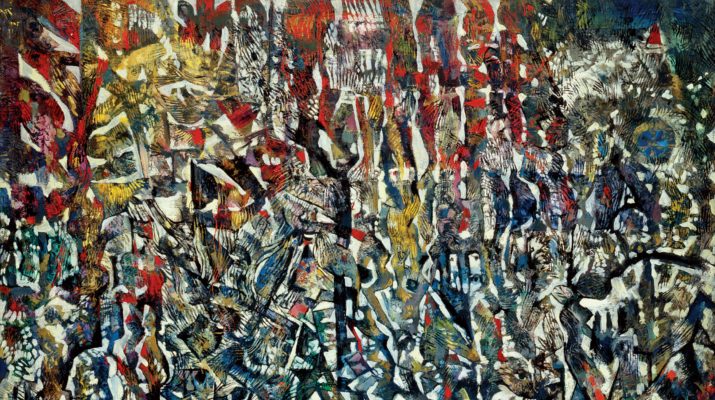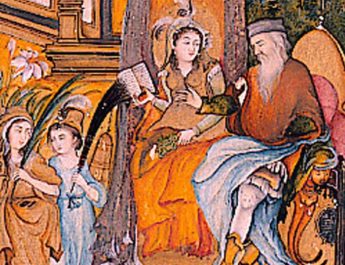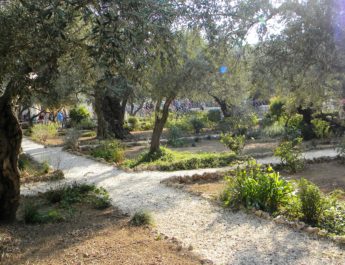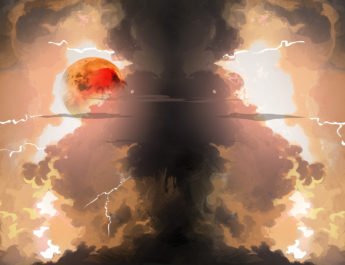Genesis 11
BibleHub
1 Now the whole earthI hadII oneIII languageIV and the sameV words.VI
Notes on verse 1
I “earth” = erets. Root may mean to be firm. This is earth, ground, field land, or country.
II “had” = hayah. This is to be or become, to happen.
III “one” = echad. Perhaps from achad (to unify, continue on a path; figuratively, to gather one’s thoughts). This is the number one, first, united. It can also be alone, altogether, a certain, a few.
IV “language” = saphah. This is lip, edge border, bank – used for a boundary. It can also be speech or language.
V “same” = echad. Same as “one” in v1. See note III above.
VI “words” = dabar. From dabar (to speak, declare, discuss). This is speech, a word, a matter, an affair, charge, command, message, promise, purpose, report, request. It is a word, which implies things that are spoken of in a wide sense.
2 AndVII as they migratedVIII from the east,IX they came uponX
Notes on verse 2a
VII {untranslated} = hayah. Same as “had” in v1. See note II above.
VIII “migrated” = nasa. This is properly pulling up as when one pulls up tent pegs or stakes. This would imply striking tents in order to start a journey. So this could be bring, pullout, set out, journey, or cause to go away.
IX “east” = qedem. Perhaps from qadam (to come in front or be in front; to meet, anticipate, confront, receive, or rise; sometimes to meet for help). This is front, formerly, before, east, eternal, everlasting, antiquity.
X “came upon” = matsa. This is to find, catch or acquire. It can also mean to come forth or appear. Figuratively, this can mean to meet or be together with.
a plainXI in the landXII of ShinarXIII and settledXIV there.
Notes on verse 2b
XI “plain” = biqah. From baqa (to divide, split open, tear, breach, break open, dash to pieces). This is a valley or plain. Properly, it refers to a place where the mountains have split – a wide, flat valley between them.
XII “land” = erets. Same as “earth” in v1. See note I above.
XIII “Shinar” = Shinar. 8x in OT – 4x in Gen, 1x in Jos, 1x in Isa, 1x in Dan, and 1x in Zech. This is the word used for Babylon in the Tower of Babel story. May be a corruption of Hebrew for two rivers or two cities. May also be a form of the Akkadian Shumeru (Sumer – what the Akkadians called the non-Semitic speaking peoples of Mesopotamia who called themselves ug sag gig ga or sang-ngiga. Lit. the black-headed people. These people called their land kiengi – the place of the noble lords). See https://en.wikipedia.org/wiki/Shinar & https://en.wikipedia.org/wiki/Sumer
XIV “settled” = yashab. This is to sit and so to remain and so to dwell. It is sitting for any reason – as a judge, in order to ambush, or just sitting quietly. Causatively, this can mean settling or marrying. This can also mean continue, endure, or establish.
3 And they said to oneXV another,XVI “Come,XVII let us makeXVIII bricks,XIX
Notes on verse 3a
XV “one” = ish. Perhaps from enosh (human, humankind, mortal); from anash (to be weak, sick, or frail). This is man, husband, another, or humankind.
XVI “another” = rea. From raah (to graze, tend a flock, keep company with; to pasture in a literal or figurative sense). This is an associate, companion, friend, neighbor, or other. It can also be used for close family or for a lover.
XVII “come” = yahab. This is give, put, bring, take. It is to give in a literal or figurative sense.
XVIII “make” = laban. 8x in OT. This is to be white or make a brick.
XIX “bricks” = lebenah. Related to “make” in v3. 11x in OT. From laban (see note XVIII above). This is a brick or pavement.
and burnXX them thoroughly.”XXI And they had brick for stone,XXII and bitumenXXIII for mortar.XXIV
Notes on verse 3b
XX “burn” = saraph. This is to burn or kindle. This is the root that “seraphim” comes from.
XXI “thoroughly” = serephah. Related to “burn” in v3. 13x in OT. From saraph (see note XX above). This is blaze, burning, or cremation.
XXII “stone” = eben. This is a stone, weight, or mason. It is part of the word “Ebenezer.”
XXIII “bitumen” = chemar. 3x in OT – used of the tower of Babel and the basket that Moses was floated in. From chamar (to boil up, ferment, be red befoul, trouble, daub). This is bitumen or asphalt.
XXIV “mortar” = chomer. Related to “bitumen” in v3. From chamar (see note XXIII above). This is something that bubbles up like sea foam, mire, clay, a heap. It is also cement, mortar and a dry measure.
4 Then they said, “Come, let us buildXXV ourselves a city,XXVI and a towerXXVII with its topXXVIII in the heavens,XXIX
Notes on verse 4a
XXV “build” = banah. This is to build, make, set up, restore, repair, or obtain children. It is to build literally or figuratively
XXVI “city” = iyr. From uwr (to awaken or wake oneself up). This can mean excitement in the sense of wakefulness or city. Properly, this is a place that is guarded. Guards kept schedules according to watches. This sense of the word would include cities as well as encampments or posts that were guarded.
XXVII “tower” = migdal. From gadal (to grow, grow up, be great, magnify, exalt). This is a tower, podium, bed of flowers. This is perhaps the root of “Magdalene.”
XXVIII “top” = rosh. This may come a word that means to shake. It is the head, captain, or chief. It can also be excellent or the forefront. It can be first in position or in statue or in time (i.e. the beginning).
XXIX “heavens” = shamayim. Root may mean being lofty. This is sky, the air, or heaven. It is in a dual noun form so this might refer to the part of the sky where the clouds move on the one hand and the part beyond that where the sun, moon, and stars are on the other hand.
and let us makeXXX a nameXXXI for ourselves; otherwise we shall be scattered abroadXXXII upon the faceXXXIII of the whole earth.”
Notes on verse 4b
XXX “make” = asah. This is to make, do, act, appoint, become in many senses.
XXXI “name” = shem. May be from sum (to put, place, set). This is name, fame, renown. A name was thought to indicate something essential about a person – something about their individuality. So, this word can also mean honor, authority, or character.
XXXII “scattered abroad” = puts. This is to dash in pieces, scatter, disperse, drive.
XXXIII “face” = paneh. From panah (to turn, face, appear). This is face in a literal or figurative sense. It could be face, presence, anger, respect. It can also be used of God to indicate divine favor or presence.
5 The LordXXXIV came downXXXV to seeXXXVI the city and the tower, which mortalsXXXVII had built.
Notes on verse 5
XXXIV “Lord” = YHVH. Perhaps related to “had” in v1. From havah (to be, become) or hayah (see note II above). This is the name of the God of Israel, the self-existent and eternal one, the tetragrammaton. This pronunciation has been lost to time so “Lord” is generally used in its place.
XXXV “came down” = yarad. This is to go down, descend; going down in a literal or figurative sense. It can be going to the shore or a boundary, bringing down an enemy.
XXXVI “see” = raah. This is to see in a literal or figurative sense so stare, advise, think, view.
XXXVII “mortals” = ben + adam. Literally “children of humanity.” Ben is related to “build” in v4. From banah (see note XXV above). This is son, age, child. It is son in a literal or figurative sense. Adam is perhaps from adam (to be red, make ruddy); related to adamah (ground, dirt, earth). This is man, humankind, also Adam’s name. It refers to a human individual or humanity.
6 And the Lord said, “Look,XXXVIII they are one people,XXXIX and they have all one language; and this is only the beginningXL of what they will do;XLI nothing that they proposeXLII to do will now be impossibleXLIII for them.
Notes on verse 6
XXXVIII “look” = hen. This is a remark of surprise or excitement: lo! Behold! It can also mean if or though.
XXXIX “people” = am. From amam (to darken, hide, associate; creating shadows by huddling together). This is people or nation. It can be used specifically for a tribe, collectively of troops or armies, or figuratively to refer to a flock of animals.
XL “is…the beginning” = chalal. This is to pierce, which implies to wound. It is used figuratively for making someone or something profane or breaking your word. It can also mean to begin as though one opened a wedge. Also, to eat something as a common thing.
XLI “do” = asah. Same as “make” in v4. See note XXX above.
XLII “propose” = zamam. 13x in OT. This is to devise, plot, imagine, intend, scheme, think evil. It is usually used in an evil sense.
XLIII “will…be impossible” = batsar. This is to enclose, wall up, or make something inaccessible, impenetrable, isolated. It can also mean to fortify, something mighty. It can also mean to gather grapes.
7 Come, let us go down, and confuseXLIV their language there, so that they will not understandXLV one another’sXLVI speech.”
Notes on verse 7
XLIV “confuse” = balal. This is to anoint, mix, overflow. It can also be to fodder or temper.
XLV “understand” = shama. This is to hear, call, consent, or consider. It implies listening intelligently, giving attention, and, because of these two factors, obedience and action are often implied.
XLVI “one another’s” = enosh…rea. Enosh is related to “one” in v3. See note XV above. Rea is the same as “another” in v3. See note XVI above.
8 So the Lord scattered them abroad from there over the face of all the earth, and they left offXLVII building the city. 9 Therefore it was calledXLVIII Babel,XLIX because there the Lord confused the language of all the earth; and from there the Lord scattered them abroad over the face of all the earth.
Notes on verses 8-9
XLVII “left off” = chadal. This is properly to be flabby – it implies, to stop, fall, end, rest, leave alone, forsake, or desist. Figuratively this can be lacking or idle.
XLVIII “called” = qara + shem. Literally “its name is called.” Qara is to call or call out – to call someone by name. Also used more broadly for calling forth. Shem is the same as “name” in v4. See note XXXI above.
XLIX “Babel” = Babel. Perhaps related to “confuse” in v7. Perhaps from balal (see note XLIV above) OR from Akkadian Bbilim; perhaps from earlier Sumerian name Ca-dimirra (gate of god). This is Babylon or Babel. See https://en.wikipedia.org/wiki/Babylon.
10 These are the descendantsL of Shem.LI When Shem was one hundred years old,LII he became the father ofLIII ArpachshadLIV two years after the flood;LV
Notes on verse 10
L “descendants” = toledoth. From yalad (to bear, bring forth; can mean to act as midwife or to show one’s lineage). This is generations descent, family, or history.
LI “Shem” = Shem. Related to “name” in v4. From shem (see note XXXI above). This is Shem, meaning name.
LII “old” = ben. Same as “mortals” in v10. See note XXXVII above.
LIII “became the father of” = yalad. Related to “descendants” in v10. See note L above.
LIV “Arpachshad” = Arpakshad. 9x in OT. This is Arpachshad and the place where he and his descendants lived. It may mean “boundary of the Chaldeans,” “light trickles as if he were a breast,” “he gathers mascara like a demon” or “Nile in a Bottle – What a Boob!” See https://www.abarim-publications.com/Meaning/Arpachshad.html
LV “flood” = mabbul. 13x in OT. Perhaps from yabal (to bring, carry, flow, lead forth). This is a flood or deluge.
11 and Shem livedLVI after the birth ofLVII Arpachshad five hundred years, and hadLVIII other sonsLIX and daughters.LX
Notes on verse 11
LVI “lived” = chayah. This is to live or keep alive in a literal or figurative sense. So, it an be revive, nourish, or save.
LVII “the birth of” = yalad. Same as “became the father of” in v10. See note LIII above.
LVIII “had” = yalad. Same as “became the father of” in v10. See note LIII above.
LIX “sons” = ben. Same as “mortals” in v5. See note XXXVII above.
LX “daughters” = bat. Related to “build” in 4 & “mortals” in v5. From ben (see note XXXVII above). This is daughter literally and figuratively.
12 When Arpachshad had lived thirtyLXI-five years, he became the father of Shelah;LXII 13 and Arpachshad lived after the birth of Shelah fourLXIII hundred threeLXIV years, and had other sons and daughters.
Notes on verses 12-13
LXI “thirty” = sheloshim. From the same as shalosh (three, fork, triad). This is thirty or thirtieth.
LXII “Shelah” = Shelach. 9x in OT. From shelach (a weapon, spear, defense, plant, shoot, branch, missile); {from shalach (to send, send for, forsake, give a slave freedom). This is Shelah, Shelach, or Salah. It may mean “sent out,” branch,” “javelin,” or “request.” See https://www.abarim-publications.com/Meaning/Shelah.html
LXIII “four” = arba. From raba (to make square or be four-sided). This is four.
LXIV “three” = shalosh. Related to “thirty” in v12. See note LXI above.
14 When Shelah had lived thirty years, he became the father of Eber;LXV 15 and Shelah lived after the birth of Eber four hundred three years, and had other sons and daughters.
16 When Eber had lived thirty-four years, he became the father of Peleg;LXVI 17 and Eber lived after the birth of Peleg four hundred thirty years, and had other sons and daughters.
18 When Peleg had lived thirty years, he became the father of Reu;LXVII 19 and Peleg lived after the birth of Reu two hundred nineLXVIII years, and had other sons and daughters.
Notes on verses 14-19
LXV “Eber” = Eber. 15x in OT. From the same as eber (the region beyond, passage, quarter, opposite side; generally the east); from abar (to pass over, pass through, or pass by; cross over or to alienate; used for transitions). This is Eber, meaning “region beyond.” It is the name of several people and also may be the root of the word “Hebrew.”
LXVI “Peleg” = Peleg. 7x in OT. From palag (to split or divide in a literal or figurative sense; to confound). This is Peleg, perhaps meaning “earthquake” or “division.”
LXVII “Reu” = R’uw. Related to “another” in v3. 5x in OT. From rei (a pasture, grazed in a pasture); from raah (see note XVI above). This is Reu, perhaps meaning “friend.”
LXVIII “nine” = tesha. Perhaps from sha’ah (to gaze at, gaze around, regard – to look to, especially for help; to consider or be compassionate; to look at in amazement or while confounded). This is nine, perhaps as looking to the next number associated with fullness (10).
20 When Reu had lived thirty-twoLXIX years, he became the father of Serug;LXX 21 and Reu lived after the birth of Serug two hundred sevenLXXI years, and had other sons and daughters.
22 When Serug had lived thirty years, he became the father of Nahor;LXXII 23 and Serug lived after the birth of Nahor two hundred years, and had other sons and daughters.
Notes on verses 20-23
LXIX “two” = shenayim. From sheni (double, again, another, second); from shanah (to fold, repeat, double, alter, or disguise). This is two, both, second, couple.
LXX “Serug” = Serug. 5x in OT. From sarag (to be knit together, wreath). This is Serug, perhaps meaning, “tendril.”
LXXI “seven” = sheba. This is seven or by sevenfold. It can also be used to imply a week or an indefinite number. Symbolically, this is the number of fullness, sacredness, perfection
LXXII “Nahor” = Nachor. 18x in OT. From the same as nachar (nostril or snorting; root means to snort or snore). This is Nachor or Nahor, meaning “snorer.”
24 When Nahor had lived twentyLXXIII-nine years, he became the father of Terah;LXXIV 25 and Nahor lived after the birth of Terah one hundred nineteenLXXV years, and had other sons and daughters.
Notes on verses 24-25
LXXIII “twenty” = esrim. From eser (ten). This is twenty or twentieth.
LXXIV “Terah” = Terach. 13x in OT. Perhaps from tarah (to turn, wander) OR from tor (dove) + ruach (breath, wind, air, cool, spirit; wind, which resembles the breath; figuratively, life itself or being frail/mortal/impermanent; air of the sky or the spirit). This is Terah or Terach, maybe meaning “delay, “wanderer,” or “global spirit.” See https://www.abarim-publications.com/Meaning/Terah.html#.X2Tov2hKhPY
LXXV “nineteen” = tesha + asar. Tesha is the same as “nine” in v19. See note LXVIII above. Asar is related to “twenty” in v24. From the same as eser (see note LXXIII above). It is ten or -teenth.
26 When Terah had lived seventyLXXVI years, he became the father of Abram,LXXVII Nahor, and Haran.LXXVIII
Notes on verse 26
LXXVI “seventy” = shibim. Related to “seven” in v21. From sheba (see note LXXI above). This is seventy.
LXXVII “Abram” = Abram. From the same as Abiram (exalted father, a high father – lofty) {from ab (father literal or figurative) + rum (rise, bring up, being high, extol, exalt, haughty; to raise in a literal or figurative sense)}. This is Abram, exalted father.
LXXVIII “Haran” = Haran. 7x in OT. Perhaps from har (mountain, hill, hilly region); from harar (hill or mountain). This is Haran, meaning “Mountaineer.”
27 Now these are the descendants of Terah. Terah was the father of Abram, Nahor, and Haran; and Haran was the father of Lot.LXXIX 28 Haran diedLXXX beforeLXXXI his fatherLXXXII Terah
Notes on verses 27-28a
LXXIX “Lot” = Lot. From the same as lot (envelope, veil); from lut(to wrap, envelop). This is Lot, “covering.”
LXXX “died” = mut. This is to die in a literal or figurative sense. It can also refer to being a dead body.
LXXXI “before” = paneh. Same as “face” in v4. See note XXXIII above.
LXXXII “father” = ab. Related to “Abram” in v26. See note LXXVII above.
in the land of his birth,LXXXIII in UrLXXXIV of the Chaldeans.LXXXV
Notes on verse 28b
LXXXIII “birth” = moledeth. Related to “descendants” and “became the father of” in v10. From yalad (see note L above). This is kindred, offspring, birthplace, lineage, native country, or family.
LXXXIV “Ur” = Uwr. 5x in OT. From the same a uwr (fire, light, the east); from or (to be or become light, shine). This is Ur in Babylon as well as a personal name. It may mean “flame” or “light.” See https://www.abarim-publications.com/Meaning/Ur.html
LXXXV “Chaldeans” = Kasdi. From Kesesd (Kesed, one of Nahor’s sons). This is Chaldean – part of southern Babylon and the people who lived there. They were famous for their astrologers. The name meaning is uncertain.
29 Abram and Nahor took wives;LXXXVI the name of Abram’s wife was Sarai,LXXXVII and the name of Nahor’s wife was Milcah.LXXXVIII She was the daughter of Haran the father of Milcah and Iscah.LXXXIX
Notes on verse 29
LXXXVI “wives” = ishshah. Related to “one” in v3 & “one another’s” in v7. From ish (see note XV above). This is woman, wife, or female.
LXXXVII “Sarai” = Saray. 17x in OT. From the same as sar (chief, ruler, lord, official, governor, prince; someone at the top of a rank or class). This is Sarai, which means princess or ruler.
LXXXVIII “Milcah” = Milchah. 11x in OT. From malkah (queen); from melek (king, royal). This is Milcah or Milkah, meaning “queen.”
LXXXIX “Iscah” = Yiskah. 1x in OT. Perhaps from Aramaic (to see). This is Yiskah. Her name may be the root of “Jessica.” See https://en.wikipedia.org/wiki/Iscah
30 Now Sarai wasXC barren;XCI she had no child.XCII
Notes on verse 30
XC “was” = hayah. Same as “had” in v1. See note II above.
XCI “barren” = aqar. 12x in OT. From the same as eqer (stock, member, offshoot; figuratively, could be a descendant or someone who is transplanted like an immigrant who takes up permanent residence); from aqar (to uproot, pluck out, dig out by the roots, to hamstring; figuratively, to exterminate). This is barrenness or a woman who is barren.
XCII “child” = yalad. Related to “descendants” and “became the father of” in v10 & “birth” in v28. 1x in OT. From yalad (see note L above). This is offspring or child.
31 Terah took his son Abram and his grandsonXCIII Lot son of Haran, and his daughter-in-lawXCIV Sarai, his son Abram’s wife, and they went out together from Ur of the Chaldeans to goXCV into the land of Canaan;XCVI but when they came to Haran,XCVII they settled there. 32 The days of Terah were two hundred five years; and Terah died in Haran.
Notes on verses 31-32
XCIII “grandson” = ben + ben. Literally “son of his son.” Ben is the same as “mortals” in v5. See note XXXVII above.
XCIV “daughter-in-law” = kallah. Perhaps related to kalal (to complete, perfect). This is bride or daughter-in-law and the term is used before and after marriage.
XCV “go” = halak. This is go, come, walk. It is walk literally and figuratively and includes people and animals. It can be used figuratively for one’s moral life – how we walk according to God’s way or against it. It can also refer to the walk of life as in the course one’s life takes, the choices we make, etc.
XCVI “Canaan” = Kna’an. From kana’ (to be humble, subdue; properly, bend the knee). This is Canaan, his descendants, and the land where they settled. This could mean lowlands, describing their land or subjugated in reference to being conquered by Egypt. See https://en.wikipedia.org/wiki/Canaan
XCVII “Haran” = Charan. 12x in OT. From Assyrian arranu (road, crossroads, junction of trade routes) OR from charar (to be scorched, burn, glow, dry up; figuratively, to show passion). This is Haran, meaning crossroads. It is also a proper name meaning parched.
Image credit: “The Tower of Babel” by Endre Rozsda, 1958.




